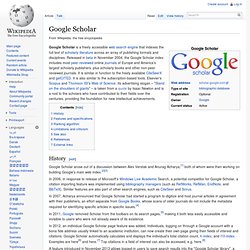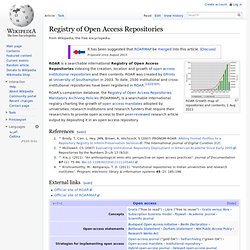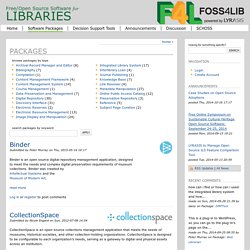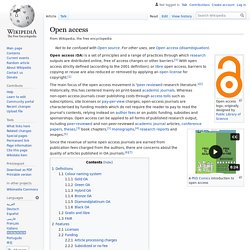

The Noun Project. Google Scholar. Google Scholar is a freely accessible web search engine that indexes the full text of scholarly literature across an array of publishing formats and disciplines.

Released in beta in November 2004, the Google Scholar index includes most peer-reviewed online journals of Europe and America's largest scholarly publishers, plus scholarly books and other non-peer reviewed journals. It is similar in function to the freely available CiteSeerX and getCITED. It is also similar to the subscription-based tools, Elsevier's Scopus and Thomson ISI's Web of Science. Its advertising slogan – "Stand on the shoulders of giants" – is taken from a quote by Isaac Newton and is a nod to the scholars who have contributed to their fields over the centuries, providing the foundation for new intellectual achievements.
History[edit] Google Scholar arose out of a discussion between Alex Verstak and Anurag Acharya,[1] both of whom were then working on building Google's main web index.[2][3] Benefits of Publishing with IEEE. Spiral:Home. Greenwich Academic Literature Archive - Greenwich Academic Literature Archive. UCL Discovery - UCL Discovery Unlocking UCL research. Registry of Open Access Repositories. ROAR Growth map of repositories and contents, 1 Aug 2011 ROAR is a searchable international Registry of Open Access Repositories indexing the creation, location and growth of open access institutional repositories and their contents.

ROAR was created by EPrints at University of Southampton in 2003. To date, 2500 institutional and cross-institutional repositories have been registered in ROAR.[1][2][3][4] ROAR's companion database, the Registry of Open Access Repositories Mandatory Archiving Policies (ROARMAP), is a searchable international registry charting the growth of open access mandates adopted by universities, research institutions and research funders that require their researchers to provide open access to their peer-reviewed research article output by depositing it in an open access repository. References[edit] Jump up ^ Brody, T, Carr, L, Hey, JMN, Brown, A, Hitchcock, S (2007) PRONOM-ROAR: Adding Format Profiles to a Repository Registry to Inform Preservation Services.
Library Open-Source Software Registry. Submitted by Peter Murray on Thu, 2015-05-14 10:17 Binder is an open source digital repository management application, designed to meet the needs and complex digital preservation requirements of museum collections.

Binder was created byArtefactual Systems and theMuseum of Modern Art. Submitted by Nicole Engard on Sun, 2012-07-08 14:54 CollectionSpace is an open-source collections management application that meets the needs of museums, historical societies, and other collection-holding organizations. CollectionSpace is designed to be configurable to each organization’s needs, serving as a gateway to digital and physical assets across an institution. Submitted by acocciolo on Mon, 2015-05-04 08:55 FixityBerry is software that runs on a Raspberry Pi computer that runs fixity scans on all hard drives connected via USB.
Submitted by porterolsen on Mon, 2013-01-28 13:10 BitCurator uses open source digital forensics tools to help collecting institutions manage born-digital materials. Open access. Research publications that are distributed online, free of cost or other access barriers Open access (OA) is a set of principles and a range of practices through which research outputs are distributed online, free of cost or other access barriers.[1] With open access strictly defined (according to the 2001 definition), or libre open access, barriers to copying or reuse are also reduced or removed by applying an open license for copyright.[1] The main focus of the open access movement is "peer reviewed research literature.

"[2] Historically, this has centered mainly on print-based academic journals. Whereas conventional (non-open access) journals cover publishing costs through access tolls such as subscriptions, site licenses or pay-per-view charges, open-access journals are characterised by funding models which do not require the reader to pay to read the journal's contents. Definitions[edit] Colour naming system[edit] Gold OA[edit] Green OA[edit] Green OA is gratis for the author. FAIR[edit]